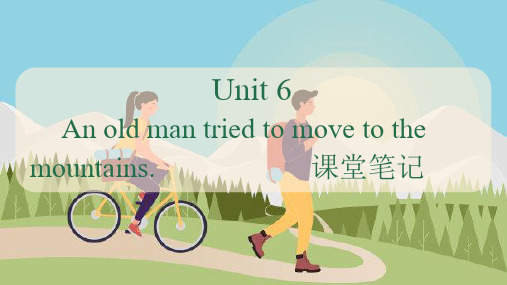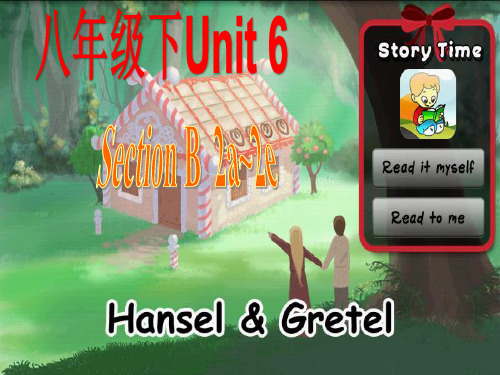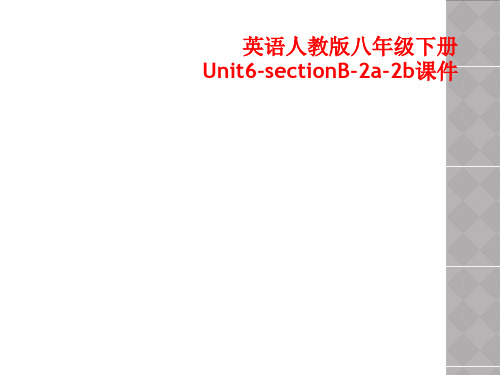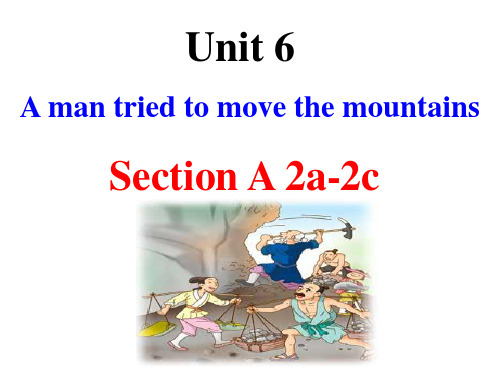人教版八年级英语下册Unit6课件
合集下载
新课标人教版八年级英语下册Unit6课件

How long has he been playing baseball?
(two hours) He has been playing baseball for two hours.
How long have they been working?(a week) They have been working for a week .
How long have you been learning English?
We ‘ve been learning English for 2 years. We have been learning English since 2007. We’ve been learning English since 2 years ago. When did you start learning English? We started learning English in 2007/ 2 years ago.
(二) 引导时间的介词for与since的区别
( for与since引导的短语用how long提问 )
for
表示时间的持续
since
表示“自从过去某 一时间点以来”
for + 时间段
强调一段时间
since + 时间点
强调动作或状态 一直延续到现在
时间状语
for与since引导的短语 five minutes
A: How long did you sleep last night?
B: I slept for …
A: When did you start claБайду номын сангаасs today? B: I started class at … B: I have been in class for …
Unit6笔记课件人教版英语八年级下册

02
Grammar Foucus
Language points 1.be moved 被感动
Point
I was moved by his story. 我被他的故事所感动。 moving意为“感人的”。如: ①His story is moving. 他的故事是感人的。 ②I was moved by his moving story. 我被他感人的故事感动了。
Language points 2.remind 提醒;使想起
Point
remind作及物动词时,意为“提醒;使想起”。 (1)常用remind sb.+that 从句/what 从句,意为“提醒某人去 做某事;使某人想起去做某事”。如: ①Would you please remind him that we will put off the meeting? 请你提醒他我们将推迟会议好吗?
Point
(3)so... that意为“如此……以至于……”, 引导结果状语从句,so后面
接形容词或者副词,that后面接句子。如:
②Sometimes he makes the stick so small that he can keep it in his
ear.
有时候他把棍子变得如此的小以至于他能把它放在耳朵里。
这本书如此有趣以至于我们班所有的学生都对它感兴趣。
Language points 5.Western 西方国家的;欧美的;西方的
Point
①As we know, there are many differences between Western culture and Chinese culture. 正如我们所知,西方文化和中国文化有很多不同。 ②Xinjiang is in the western part of China. 新疆在中国的西部。 注意:west 是名词,表示方位,前面要加定冠词the,如:in the west of China 在中国的西部。
初中英语 人教版八年级下册unit 6 单词课件(ppt51张)

My father will do the dishes instead of my mother. Mike took part in the game instead of me last week. Tony went fishing instead of going swimming. 注意:instead和instead of有时可以相互转换。 如: Lisa didn’t listen to music. Instead, she read. =Lisa read instead of listening to music.
fit v. 适合;合身 1 vi 合适 e.g. The new shoes don’t fit, so she
gave them back. 新鞋子不太合适,因此她退了。
Ⅱ. 完成句子,每空一词。 1)提醒汤姆明天参加聚会。
_R_e_m__i_n_d_ Tom ____t_o___ ____g_o___ to the party tomorrow. 2)这封信让我想起了他以前说过的话。 The letter _r_e_m__in_d_s_ me ____o_f ___ what he said before. 3)我提醒简我们星期六有个会议。 I _r_e_m_i_n_d_e_d_ Jane __t_h_a_t___ we had a meeting on Saturday.
e.g. The picture reminds him of his beautiful hometown. 这幅画让他想起了美丽的故乡。
remind sb. to do sth. 提醒某人去做某事
e.g. Please remind me to come back early. 请提醒我早点回来。
人教版英语八年级下册Unit 6 An old man tried to move the mountainsSection B2a_2e课件

Father: cowardly(懦弱的 ), foolish(愚蠢的) weak
Hansel: brave(勇敢的 ), smart Gretel: scared, worried,
2d Read the play again and answer the questions.(2d)
1. Why does the wife tell her husband to leave the children in the forest? P 1 Unless he leaves the children to die in the forest, the whole family will die because they don’t have enough food.
that we should follow it. Gretel: Look! It’s leading us to that wonderful
把…带到;领到;
house made of bread, cake and candy.
由…制成
Hansel: Let’s eat part of the house!
2c Scan and match each description below with the correct scene.
Scene 1 A. The children get lost.
Scene 2
B. The children wake up.
Scene 3
C. The children cannot find the
the moon rises, we can follow them
instead.
C The children cannot find the
Hansel: brave(勇敢的 ), smart Gretel: scared, worried,
2d Read the play again and answer the questions.(2d)
1. Why does the wife tell her husband to leave the children in the forest? P 1 Unless he leaves the children to die in the forest, the whole family will die because they don’t have enough food.
that we should follow it. Gretel: Look! It’s leading us to that wonderful
把…带到;领到;
house made of bread, cake and candy.
由…制成
Hansel: Let’s eat part of the house!
2c Scan and match each description below with the correct scene.
Scene 1 A. The children get lost.
Scene 2
B. The children wake up.
Scene 3
C. The children cannot find the
the moon rises, we can follow them
instead.
C The children cannot find the
Unit6期末复习课件2022-2023学年人教版英语八年级下册

7. fit
That jacket fits well.
keep fit = keep healthy fit: v. 适合/合身; adj. 健壮的,健康的,适合的
名词
1. voice (区分noise, sound) a. “I promise,” she said in a small __v_o_i_ce___. b. They were making too much_n_o_i_se__. c. _S_o_u_n_d_ travels much more slowly than light.
U6 An old man tried to move the mountains.
01 Words 02 Phrases
目录
03 Grammar 04 Homework
PART.01
Word s
单词短语听写
1. 提醒,使想起 2. 隐藏(do-did-done) 3. 金子 / 金色的 4. 欺骗 5. 全部的,整体的 6. 带路(do-did-done) 7. 嗓音 8. 勇敢的 9. 有魔力的 10. 西方国家的 11. 结婚 12. 物体,物品 13. 虚弱的 14. 愚蠢的 15. 使激动 16. 合身 (do-did-done)
2. object: 可数 3. couple:夫妻,两人,两件事物 a couple of sth: 两个/ 几个 a young couple 一对年轻夫妻
名词
4. 对比:gold golden(金黄色的) __g_ol_d_e_n_hair ___g_ol_d__watch(金表)
其他: 1. silk(不可数) Silk Road 2. ground(不可数) playground (可数) 3. smile(可数) have a big smile on her face
That jacket fits well.
keep fit = keep healthy fit: v. 适合/合身; adj. 健壮的,健康的,适合的
名词
1. voice (区分noise, sound) a. “I promise,” she said in a small __v_o_i_ce___. b. They were making too much_n_o_i_se__. c. _S_o_u_n_d_ travels much more slowly than light.
U6 An old man tried to move the mountains.
01 Words 02 Phrases
目录
03 Grammar 04 Homework
PART.01
Word s
单词短语听写
1. 提醒,使想起 2. 隐藏(do-did-done) 3. 金子 / 金色的 4. 欺骗 5. 全部的,整体的 6. 带路(do-did-done) 7. 嗓音 8. 勇敢的 9. 有魔力的 10. 西方国家的 11. 结婚 12. 物体,物品 13. 虚弱的 14. 愚蠢的 15. 使激动 16. 合身 (do-did-done)
2. object: 可数 3. couple:夫妻,两人,两件事物 a couple of sth: 两个/ 几个 a young couple 一对年轻夫妻
名词
4. 对比:gold golden(金黄色的) __g_ol_d_e_n_hair ___g_ol_d__watch(金表)
其他: 1. silk(不可数) Silk Road 2. ground(不可数) playground (可数) 3. smile(可数) have a big smile on her face
Unit 6 Section B 1a--1e 八年级英语下册单元同步精品课件(人教版)

n. 皇帝 Once upon a time, an emperor loved new clothes very much.
Two brothers came to the city andn.m黄ad金e a spenc.ia丝l c绸lothes for the emperor. They asked for much gold and silk, but they
• Do not believe things without evidence. • Speak up if they know the truth.
What a funny story! 感叹句是表示说话时惊异、喜悦、赞赏、愤怒等感情 的句子。多用what或how开头,句末用感叹号。感叹 句可省略主语和谓语。
When the emperor _l_o_o_k_e_d_ at himself, he only __sa_w___ his underwear.
Nobody wanted to sound stupid. But suddenly, a young boy _sh_o_u__te_d_, “Look! The emperor isn’t _w_e_a_r_in__g_ any clothes. ”
…silk and gold, but…
When…looked at…
…walked through...Nobody wanted…isn’t wearing
Tal king
Once upon a time, there was an emperor. He loved clothes very much. He loved buying clothes and looked at his beautiful clothes.
英语人教版八年级下册Unit6-sectionB-2a-2b课件

The Emperor’s New
stones witch candy house
Hansel and Gretel
Self-study(自主学习)
Learn the new words and phrases in groups.
(小组合作学习新单词)
stepmother 继母 bright 光亮地;明亮地 lead 带路;领路 brave 勇敢的;无畏的 husband 丈夫
foolish(愚蠢的) weak
Hansel: brave(勇敢的 ), smart Gretel: scared, worried,
1. 在森林__in__th_e__fo_r_e_s_t 2. 整个家庭__th_e_w_h_o_l_e_family 2. 3.制定计划做ma_k_e__a_p_l_a_n_t_o_d_o 3. 4.听见某人正在h做ea_r__sb__d_o_in_g___ 4. 5.安静be _q_u_ie_t____ 6. 在月光中in _th_e__m_o_o_n_l_ig_ht 7.砍柴__g_e_t_w_o_o_d___ 8. 沿路__a_lo_n_g__th_e__w_ay 9. 迷路_b_e_/_g_e_t _lo_s_t 10.不再__n_o__m_o_r_e____ 11面包片 _p_ie_c_e_s_o_f_b_r_e_ad 12在地上 _o_n_t_h_e_g_r_o_und 13不要紧 n_e_v_e_r_m__in_d___ 14找到出路 _f_in_d_o_n_e_’_s_w__ay out 15足够勇敢而能做 __b_ra_v_e__e_n_o_u_gh to do 16带领某人去某地 __le_a_d_s_b__to__…_ 17由…制作 b_e__m_a_d_e__o_f__
stones witch candy house
Hansel and Gretel
Self-study(自主学习)
Learn the new words and phrases in groups.
(小组合作学习新单词)
stepmother 继母 bright 光亮地;明亮地 lead 带路;领路 brave 勇敢的;无畏的 husband 丈夫
foolish(愚蠢的) weak
Hansel: brave(勇敢的 ), smart Gretel: scared, worried,
1. 在森林__in__th_e__fo_r_e_s_t 2. 整个家庭__th_e_w_h_o_l_e_family 2. 3.制定计划做ma_k_e__a_p_l_a_n_t_o_d_o 3. 4.听见某人正在h做ea_r__sb__d_o_in_g___ 4. 5.安静be _q_u_ie_t____ 6. 在月光中in _th_e__m_o_o_n_l_ig_ht 7.砍柴__g_e_t_w_o_o_d___ 8. 沿路__a_lo_n_g__th_e__w_ay 9. 迷路_b_e_/_g_e_t _lo_s_t 10.不再__n_o__m_o_r_e____ 11面包片 _p_ie_c_e_s_o_f_b_r_e_ad 12在地上 _o_n_t_h_e_g_r_o_und 13不要紧 n_e_v_e_r_m__in_d___ 14找到出路 _f_in_d_o_n_e_’_s_w__ay out 15足够勇敢而能做 __b_ra_v_e__e_n_o_u_gh to do 16带领某人去某地 __le_a_d_s_b__to__…_ 17由…制作 b_e__m_a_d_e__o_f__
人教版期八年级英语下册课件:《Unit 6 An old man tr

Yu Gong said they could put them into the sea because it’s big enough to hold everything.
Yu Gong and his family began to move some of the earth and stone to the sea.
Finally, a god was so moved by Yu Gong that he sent two gods to take the mountains away.
This story reminds us that you can never know what’s possible unless you try to make it happen.
Listen and number the pictures 2a [1-4] in order to tell the story.
1
2
3
4
2b
Listen again and circle the words you hear.
1. A man saw Yu Gong and his (children / family) when they were working on moving the mountains. 2. He told Yu Gong he could never do it because he was old and (poor next?
The old man told his family that they should all helped him to move the mountains.
3. Where would they put all the earth and stone from the mountains?
- 1、下载文档前请自行甄别文档内容的完整性,平台不提供额外的编辑、内容补充、找答案等附加服务。
- 2、"仅部分预览"的文档,不可在线预览部分如存在完整性等问题,可反馈申请退款(可完整预览的文档不适用该条件!)。
- 3、如文档侵犯您的权益,请联系客服反馈,我们会尽快为您处理(人工客服工作时间:9:00-18:30)。
We need to think about the plan.我们需要考虑一下这个计划。
(3)介词between"二者之间"
eg:There is a fence between
his garden and our garden. 在他的花园和我们的 花园之间有一道栅栏。
You're to sit between Moira and me. 你坐在莫伊娜和我之 间。
I have been in class for one hour. 我上了一个小时的课。
2. Alison was the first one to start.艾丽森是第一个开始(滑)的。 “be the first / second…+ n. + to do…”表示“……是第一/ 二个做某 事的”。
He hasn't been home sincel993.1993年以来他还没有回过 家。
(3)adv. ①(与完成时态连用)从那以后;后来 eg.He left the city in 1985 and has returned only once since. 他1985年离开这座城市,自那以后只回 来过一次。 ②以前
-- How long have you learned English? 你学英语多长时间了? -- For two years. 两年了。
(2)in class 在上课;在课堂上, 其反义词为out of class “在课 外”。
eg:We should read more books out of class. 我们在课外 应该多读些书。
eg: He is the last one to leave here. 他是最后—个离开这里的。
She was the first one to get to the school.她是第一个到校的。
3. I'd like to collect stamps
because they are interesting.我喜欢集邮,因为 它们特别有趣。 (1)would like to do表示“想要 做某事”。 eg: Would you like to come to join my birthday party? 你 愿意来参加我的生日晚会吗?
(一)时态-现在完成进行时 构成形式:
have / has been + Ving
have / has是助动词 been是be的过去分词
表示从过去开始一直持续到现在的动作, 并有可能持续下去.
for +一段时间 have / has been + doing sth + since +过去的时间点
(2)collect意为“收集,搜集”, 常用作及物动词,后跟名词或代 词作宾语。 eg:I like collecting all kinds
Of Chinese stamps very much.我非常喜欢收集各种中 国邮票。
4.Thanks for sending me the
snow globe of the monster. 非常感谢您送我怪兽 雪花球形玻璃器。 (1)thanks for…相当于thank you for…意为“为……感谢 你”,后多跟名词短语或动名词。 eg:Thanks for your last letter. 谢谢你的上封来信。
(1)stop作名词,意为“车站,站 点”。 eg:I get off at the next bus stop.我在下一站下车。
(2)stop作动词,意为“停止”, 常用于stop doing sth.结构中, 表示“停止做某事”,指停止正 在做的事。
eg:The students stop talking.学生停止了讲话。(动 名词talking作宾语)
但有其不同之处:
(1)have to有时态和人称变化,带有客
观因素,意思是“不得不”;must无时
态和人称变化,后面接不带to的不定式,
带有主观因素,意思是“必须,一定”。
eg:I have to go now.It's
dark.
我必须得走了。天已黑了。
I must go.我得走了.
(2)must not表示“不许,一定不
画线部分提问: How long has he been collecting stamps?
(二) 引导时间的介词for与since的区别
( for与since引导的短语用how long提问 )
for 表示时间的持续
since
表示“自从过去 某一时间点以来”
for + 时间段 强调一段时间
since + 时间点
(4)stop sb.(from)doing sth. 表 示“叫某人停止做某事,阻止某 人做某事”。 eg:What can stop me(my)going? 有什么能阻止 我去呢?
Nothing shall stop us from studying.什么都不能阻止我们 学习。
4.have to do sth. 表示“不得不做某 事”,指客观条件的“不得不” eg: I have to finish the work by myself. 我不得不自己完成这项工作。
例句 2 他已经集邮10年了.
He has been collecting stamps for 10 years. He has been collecting stamps since 10 years ago. He has been collecting stamps since 1999.
例如:
We are waiting for you,by the way, dinner will be at eight.我们正在等着 你,还有晚饭是八点开。
(2)名词hobby表示“爱好”是可 数名词。复数:hobbies eg:Your hobby is reading. 你的爱好是看书。
One of my hobbies is astronomy. 我的爱好之一是 天文学。
【词语辨析】
1. every和each (1)each一定数目中的“每一个”;“个别” 意义较重,表示各有不同,更强调个人或个 别。 eg:Each one has his weakness. 每人都 有每人的弱点。 (2)every数目不确定的许多人或物中间的 “每一个”;“总合”意义较重,表示“大 家一致”。 eg:Every one of us is here. 我们都到了。 (3)each可作主语、同位语、定语和状语,而 every只能作定语。
2.raise 和rise (1)rise(rose,risen) v.“上升”,(一定是不及物的) n.“上升,上涨” give rise to=lead to引起,例:
The food shortage gave rise to the serious problems.食品 的短缺引起了严重的问题。
6.It made me think about differences in
food cultures between China and western countries.它使我想起了中国和西方国家在 饮食文化方面的差异。
(1)make使役动词“使;让”,后面接 不定式作宾语补足语时,不带to,类似的还 有let和have。 eg.He made the students laugh.他把同 学们逗笑了。
(2)raise vt.及物动词. “使上升, 筹集”, eg: “举起”raise one’s
hand “提出”raise a question “抚养,相当于bring
up/raise children “筹集”raise funds
3. have to与must
have to与must都有“必须”的意思,
(3)stop to do sth. 则表示“停 下来去做某事”,指停止原来的 事去做另外一件事。 eg:The students stop to talk.学生们停下来(开始)讲话。 (不定式to talk作目的状语)
We should stop to have a rest.我们应该停下来休息一会 儿。
5.run out of… 意为“从……地方跑出 来;用光……” eg:Class is over.The students run out of the classroom. 下课了,学生 们从教室里冲了出来。
【课文解析】
1. How long have you been in class
today? 你今天上了多长时间的课?(或你在课堂 多长时间?) (1)how long “多长”或“多长时间”。 对长度或时间段提问。
since + 从句 (一般过去时)
与过去时的比较:
1.I watched TV for three hours.我看了三小时 的电视.(我现在没有看电视了)
2.I have been watching TV for three hours.
我看了三小时的电视.(我现在仍然在看电 视)
例句 1 我已经学了5年的英语了. I have been learning English for 5 years.
能”;don't have toቤተ መጻሕፍቲ ባይዱ示“不必”。
eg:You mustn't go
now.
你现在不许走。
You don't have to go so
early.
你不必走那么早。
(3)Must I…?的否定回答是No,
(2)send sb. sth.相当于send sth. to sb. 表示“送给某人某物”
eg:He sent me a present for
(3)介词between"二者之间"
eg:There is a fence between
his garden and our garden. 在他的花园和我们的 花园之间有一道栅栏。
You're to sit between Moira and me. 你坐在莫伊娜和我之 间。
I have been in class for one hour. 我上了一个小时的课。
2. Alison was the first one to start.艾丽森是第一个开始(滑)的。 “be the first / second…+ n. + to do…”表示“……是第一/ 二个做某 事的”。
He hasn't been home sincel993.1993年以来他还没有回过 家。
(3)adv. ①(与完成时态连用)从那以后;后来 eg.He left the city in 1985 and has returned only once since. 他1985年离开这座城市,自那以后只回 来过一次。 ②以前
-- How long have you learned English? 你学英语多长时间了? -- For two years. 两年了。
(2)in class 在上课;在课堂上, 其反义词为out of class “在课 外”。
eg:We should read more books out of class. 我们在课外 应该多读些书。
eg: He is the last one to leave here. 他是最后—个离开这里的。
She was the first one to get to the school.她是第一个到校的。
3. I'd like to collect stamps
because they are interesting.我喜欢集邮,因为 它们特别有趣。 (1)would like to do表示“想要 做某事”。 eg: Would you like to come to join my birthday party? 你 愿意来参加我的生日晚会吗?
(一)时态-现在完成进行时 构成形式:
have / has been + Ving
have / has是助动词 been是be的过去分词
表示从过去开始一直持续到现在的动作, 并有可能持续下去.
for +一段时间 have / has been + doing sth + since +过去的时间点
(2)collect意为“收集,搜集”, 常用作及物动词,后跟名词或代 词作宾语。 eg:I like collecting all kinds
Of Chinese stamps very much.我非常喜欢收集各种中 国邮票。
4.Thanks for sending me the
snow globe of the monster. 非常感谢您送我怪兽 雪花球形玻璃器。 (1)thanks for…相当于thank you for…意为“为……感谢 你”,后多跟名词短语或动名词。 eg:Thanks for your last letter. 谢谢你的上封来信。
(1)stop作名词,意为“车站,站 点”。 eg:I get off at the next bus stop.我在下一站下车。
(2)stop作动词,意为“停止”, 常用于stop doing sth.结构中, 表示“停止做某事”,指停止正 在做的事。
eg:The students stop talking.学生停止了讲话。(动 名词talking作宾语)
但有其不同之处:
(1)have to有时态和人称变化,带有客
观因素,意思是“不得不”;must无时
态和人称变化,后面接不带to的不定式,
带有主观因素,意思是“必须,一定”。
eg:I have to go now.It's
dark.
我必须得走了。天已黑了。
I must go.我得走了.
(2)must not表示“不许,一定不
画线部分提问: How long has he been collecting stamps?
(二) 引导时间的介词for与since的区别
( for与since引导的短语用how long提问 )
for 表示时间的持续
since
表示“自从过去 某一时间点以来”
for + 时间段 强调一段时间
since + 时间点
(4)stop sb.(from)doing sth. 表 示“叫某人停止做某事,阻止某 人做某事”。 eg:What can stop me(my)going? 有什么能阻止 我去呢?
Nothing shall stop us from studying.什么都不能阻止我们 学习。
4.have to do sth. 表示“不得不做某 事”,指客观条件的“不得不” eg: I have to finish the work by myself. 我不得不自己完成这项工作。
例句 2 他已经集邮10年了.
He has been collecting stamps for 10 years. He has been collecting stamps since 10 years ago. He has been collecting stamps since 1999.
例如:
We are waiting for you,by the way, dinner will be at eight.我们正在等着 你,还有晚饭是八点开。
(2)名词hobby表示“爱好”是可 数名词。复数:hobbies eg:Your hobby is reading. 你的爱好是看书。
One of my hobbies is astronomy. 我的爱好之一是 天文学。
【词语辨析】
1. every和each (1)each一定数目中的“每一个”;“个别” 意义较重,表示各有不同,更强调个人或个 别。 eg:Each one has his weakness. 每人都 有每人的弱点。 (2)every数目不确定的许多人或物中间的 “每一个”;“总合”意义较重,表示“大 家一致”。 eg:Every one of us is here. 我们都到了。 (3)each可作主语、同位语、定语和状语,而 every只能作定语。
2.raise 和rise (1)rise(rose,risen) v.“上升”,(一定是不及物的) n.“上升,上涨” give rise to=lead to引起,例:
The food shortage gave rise to the serious problems.食品 的短缺引起了严重的问题。
6.It made me think about differences in
food cultures between China and western countries.它使我想起了中国和西方国家在 饮食文化方面的差异。
(1)make使役动词“使;让”,后面接 不定式作宾语补足语时,不带to,类似的还 有let和have。 eg.He made the students laugh.他把同 学们逗笑了。
(2)raise vt.及物动词. “使上升, 筹集”, eg: “举起”raise one’s
hand “提出”raise a question “抚养,相当于bring
up/raise children “筹集”raise funds
3. have to与must
have to与must都有“必须”的意思,
(3)stop to do sth. 则表示“停 下来去做某事”,指停止原来的 事去做另外一件事。 eg:The students stop to talk.学生们停下来(开始)讲话。 (不定式to talk作目的状语)
We should stop to have a rest.我们应该停下来休息一会 儿。
5.run out of… 意为“从……地方跑出 来;用光……” eg:Class is over.The students run out of the classroom. 下课了,学生 们从教室里冲了出来。
【课文解析】
1. How long have you been in class
today? 你今天上了多长时间的课?(或你在课堂 多长时间?) (1)how long “多长”或“多长时间”。 对长度或时间段提问。
since + 从句 (一般过去时)
与过去时的比较:
1.I watched TV for three hours.我看了三小时 的电视.(我现在没有看电视了)
2.I have been watching TV for three hours.
我看了三小时的电视.(我现在仍然在看电 视)
例句 1 我已经学了5年的英语了. I have been learning English for 5 years.
能”;don't have toቤተ መጻሕፍቲ ባይዱ示“不必”。
eg:You mustn't go
now.
你现在不许走。
You don't have to go so
early.
你不必走那么早。
(3)Must I…?的否定回答是No,
(2)send sb. sth.相当于send sth. to sb. 表示“送给某人某物”
eg:He sent me a present for
